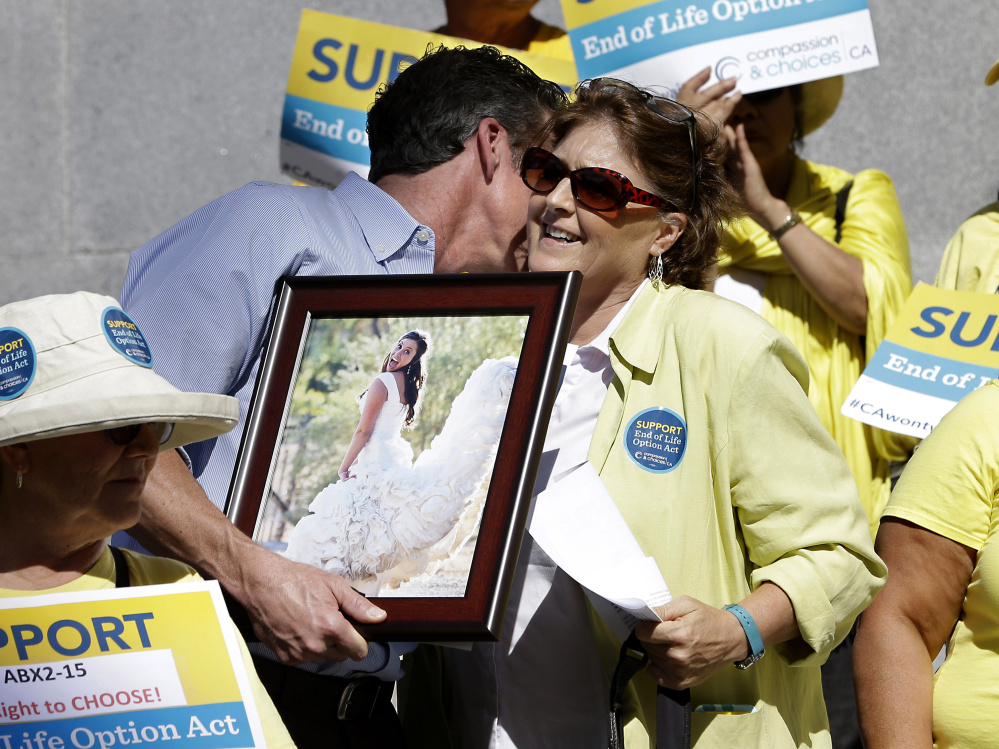SACRAMENTO, Calif. — After years of debate and months of legislative delays, one of the biggest questions looming over California’s landmark right-to-die law has been: When will it take effect?
The answer came this week: June 9. That’s 90 days from the end of a special legislative session on health care that ended Thursday. It means that for the first time, terminally ill Californians like Elizabeth Wallner will be able to legally hasten their deaths by asking doctors to prescribe lethal drug cocktails.
“It gives me a great peace of mind to know that I will not be forced to die slowly and painfully,” said Wallner, a 52-year-old single mother from Sacramento with advanced colon cancer that has spread to her liver and lungs. “The agonizingly traumatic image of me suffering will not be my family’s last memory of me.”
Wallner said she will definitely obtain the prescription if she’s still alive in June.
The fact that the law will soon take effect in the nation’s most populous state is reopening the wrenching, contentious debate that rocked California’s capital for most of last year’s legislative session.
Many of the state’s Catholics are still in disbelief that such a “travesty of compassion” has become law, said Ned Dolejsi, executive director of the California Catholic Conference.
After weeks of soul searching, Gov. Jerry Brown, a former Catholic seminarian, signed the law in October. But it couldn’t take effect until the special session that began last June came to a close. That happened on Thursday, when the state Senate approved a package of anti-smoking bills.
Modeled after an Oregon law enacted in 1997, the California legislation was inspired by Brittany Maynard, 29, a former Alamo resident with brain cancer who left her home to seek aid in dying in Portland. Her Oregon physician, Dr. Eric Walsh, will appear on CBS’ “60 Minutes” on Sunday to discuss the new law.
“When somebody is facing the end of their life, shouldn’t they be in control?” Walsh, who has prescribed the lethal medication to 19 others, told Dr. Jon LaPook, CBS News’ chief medical correspondent. “Shouldn’t I be able to help them when they’re suffering and the burden of their suffering becomes intolerable to them?”
Before her death on Nov. 1, 2014, Maynard shared her story with Brown by phone, personally appealing to him to support the bill. Her message likely helped the governor understand how much the legislation means to the terminally ill, said Democratic Sen. Bill Monning, one of the measure’s co-authors.
“This is an historic achievement,” Monning said Friday. “I would say the excitement is only tempered by the sense of loss of the amazing advocates we met along the way who did not live to see this law come into effect.”
Before last year’s victory, proponents of giving the terminally ill a right to die suffered through a series of crushing failures.
Similar bills stalled in the Legislature in 2005 and 2007. And in 1992, voters rejected a proposal that would have granted physicians the right to give a lethal injection to a patient.
But a Field Poll released last year showed that Californians’ view on the issue had evolved. The survey found two-thirds of registered voters supported a proposal to give patients the right to obtain life-ending drugs, with support cutting across most religious and political party lines.California now joins four other states where physician-assisted dying is legal: Oregon, Washington, Vermont and Montana. At least 11 states rejected such legislation last year.
Dolejsi said the Catholic Church will focus on providing terminally ill Californians with quality palliative care as well as spiritual and emotional support of the terminally ill once the legislation takes effect.
“As medical and ethical experts have shown, a desire to take one’s own life is a call for help,” Dolejsi said.
“As Catholics we must answer that cry,” he said. “The Catholic community will do so by enhancing and expanding our efforts to help people be well while dying.”
Marilyn Golden, another leading opponent of the law, said the Disability Rights Education and Defense Fund plans to focus on protecting people from abuse and coercion and educating medical professionals and pharmacists about their right to opt out.
If people are not fully informed about palliative care and hospice programs as alternatives, she said, “Assisted suicide will immediately become the cheapest treatment in our broken, profit-driven health care system.”
Copy the Story LinkSend questions/comments to the editors.



Success. Please wait for the page to reload. If the page does not reload within 5 seconds, please refresh the page.
Enter your email and password to access comments.
Hi, to comment on stories you must . This profile is in addition to your subscription and website login.
Already have a commenting profile? .
Invalid username/password.
Please check your email to confirm and complete your registration.
Only subscribers are eligible to post comments. Please subscribe or login first for digital access. Here’s why.
Use the form below to reset your password. When you've submitted your account email, we will send an email with a reset code.